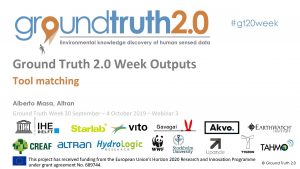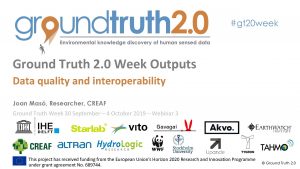Ground Truth 2.0 Week 2019 – Day 3
The third day of the Ground Truth Week started with the third and final webinar in the Ground Truth 2.0 Webinar series, in which some of the tools and outputs of GT2.0 were highlighted and discussed. The webinar started with the tool matching approach that was developed and applied by the project. Alberto Masa from Altran explained how this approach served to match the functional needs identified in each co-design group with existing tools or to indicate gaps and needs for further technical development. Dr. Joan Maso from CREAF then focused on the issue of data quality and how GT2.0 has ensure this across the seven citizen observatories. He explained that the approach starts by making the data available through OGC standard web services initially designed for automatic sensors. By doing so, the first result is that an integrated web map portal is then able to show data of the 7 observatories in a single view. Taking advantage of this, the postal is able to estimate the overall quality of the datasets collected by the Ground Truth 2.0 directly in the portal making this process easy, transparent and reproducible. Dr. Hans van der Kwast from IHE Delft introduced the concept of the Ground Truth 2.0 land use mapper which, using a layered approach, combines various open access data streams (originally derived from the Open Street Map) and provides the ability to map land use on a global level. This nicely connected with the previous presentation that also described an approach from comparing land use datasets done with different algorithms and estimate commission or omission errors in them.
Recordings of the presentations, in English, can be found here.



The Meet Mee Mechelen citizen observatory organized a second event on Wednesday to celebrate Ground Truth Week. On Tuesday, the topic of debate had been noise pollution in the city, on Wednesday the focus shifted to air quality. Meet Mee Mechelen finalized a round of air quality campaigns in the end of 2018. The results show the strong impact of road traffic on local air quality and triggered discussions on actions needed to improve urban air quality which resulted in Meet Mee Mechelen’s ‘Visie op de Mechelse Lucht’ (Vision on air quality in the city of Mechelen). This vision was presented on Wednesday evening. It is made up of a list of 22 necessary actions focusing on mobility, spatial planning, behavioral change, residential heating, urban green and air quality measurements. With the feedback obtained during this Wednesday’s event, the vision will be finalized and presented to local policy makers. The evening also marked the first joined event of Meet Mee Mechelen and Klimaan. Klimaan is a civic movement committed to a sustainable and climate-neutral society, without losing sight of the social aspect. Together with residents of Mechelen and the surrounding communities, Klimaan wants to think and act on the themes of energy, soil, water and air. As of fall 2019, Meet Mee Mechelen will join and strengthen the Klimaan family.


In Sweden, the Vatten Fokus citizen observatory organised activities in Dunkern, located 2 hours from Stockholm. The area belongs to the Södermanland county and the lake belongs to two municipalities: Flen and Gnesta. Its geographical characteristics make it ideal for water testing, as there are approximately 170 water ponds in the surroundings. Perhaps more important is the fact that some residents have shown a great level of commitment to environmental monitoring, water quality and of course, to Vatten Fokus. In Dunkern, we shadowed a ‘local hero’, a person who represents a community of 300 members, and interviewed him and a limnology expert. Vatten Fokus day was also joined by a representative of ‘Eco Village’ nearby.
